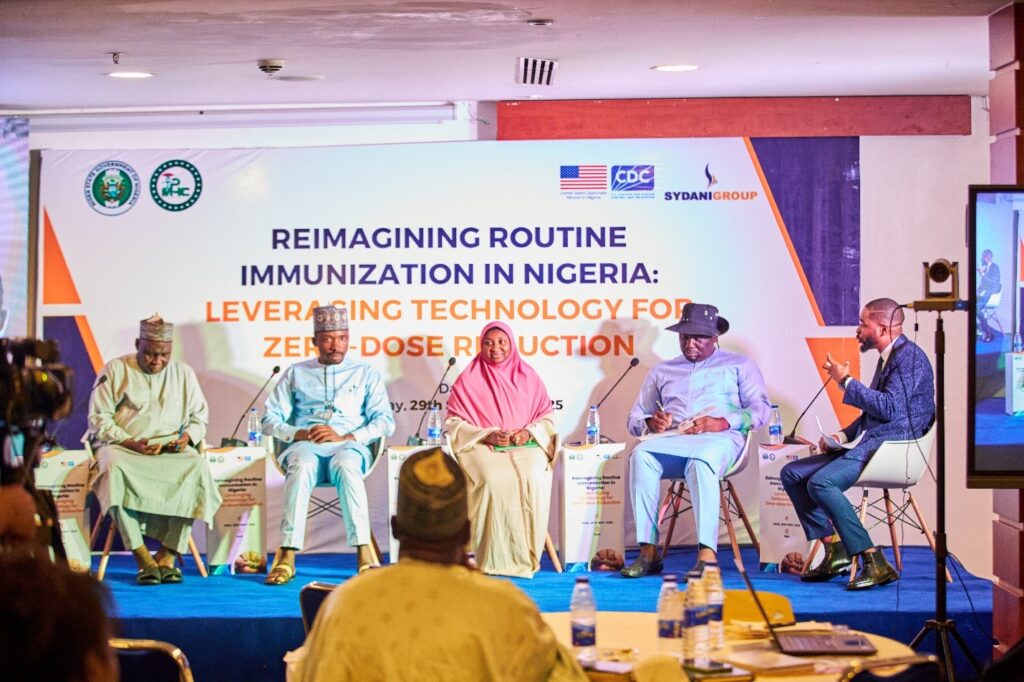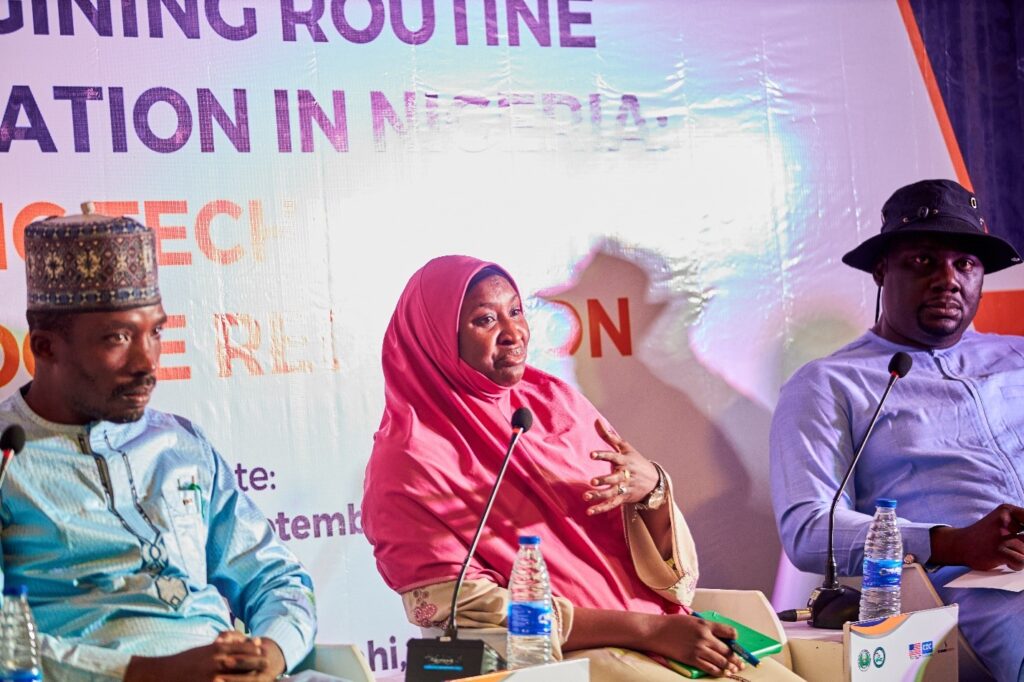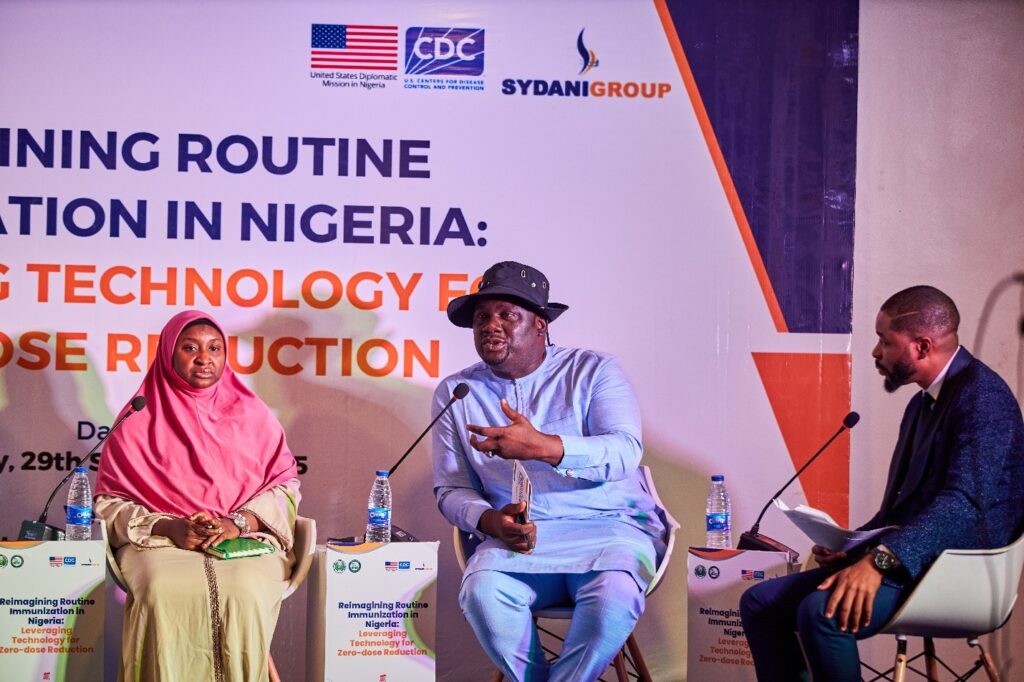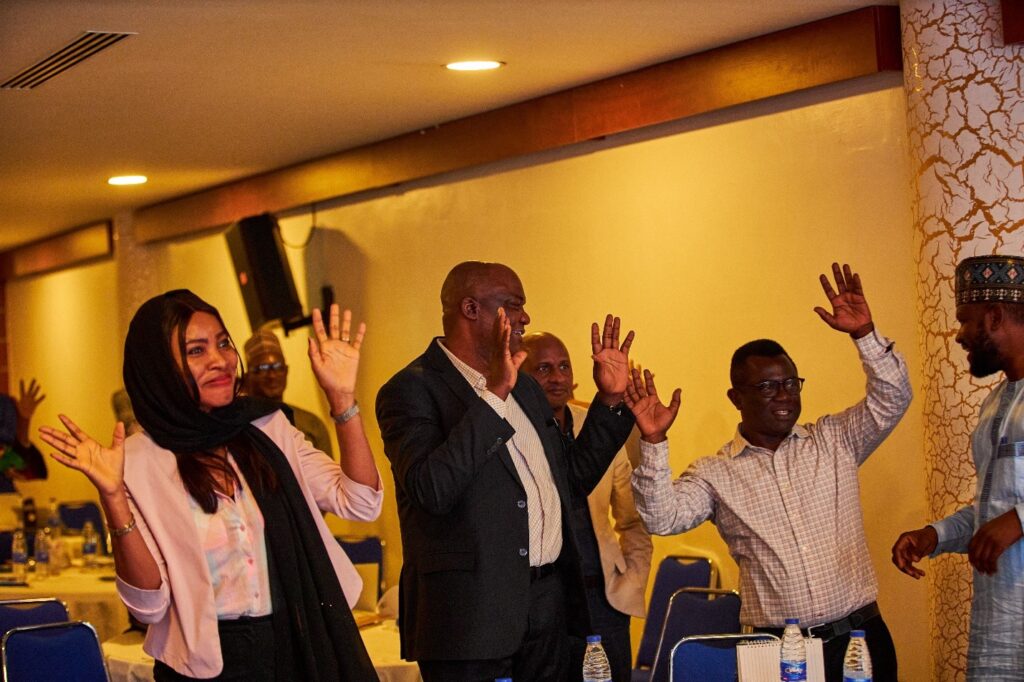From Insights to Impact: How Technology Is Powering Nigeria’s Immunization Transformation
The panel discussion of the National Learning Event on Routine Immunization held in Abuja on September 29, 2025, spotlighted how technology and collaboration are driving innovation and measurable progress across Nigerian states. Following the earlier sessions that celebrated achievements and shared state-level experiences, the day culminated in a panel discussion titled “Reimagining Routine Immunization in Nigeria: Leveraging Technology for Zero-Dose Reduction.”
The conversation brought together government representatives, state immunization managers from five states in northern Nigeria, digital health experts, and implementing partners to explore how emerging tools and data-driven approaches are reshaping the fight against zero-dose and under-immunized children. Moderated by Sydani Group, the panel provided an open forum for participants to reflect on challenges, showcase progress, and reimagine the future of immunization in Nigeria.

From the onset, panelists acknowledged that technology has become a cornerstone of Nigeria’s immunization strategy. Across the participating states of Niger, Kano, Katsina, Jigawa, and Zamfara, digital tools are now integral to planning, implementation, and monitoring of immunization activities. A representative from Niger State noted that digital dashboards have helped transform accountability mechanisms
“We now have real-time visibility into where our gaps are. Health workers can see, in a single view, which wards have the highest zero-dose burden. That kind of information helps us act faster and smarter.”
Participants emphasized that digital innovation extends beyond data visualization. In states like Katsina and Zamfara, technology has facilitated community mapping, allowing vaccination teams to identify hard-to-reach populations using geolocation tools. In Jigawa, the integration of community informants through mobile reporting apps has improved coordination between field teams and local health authorities.
However, technology’s real power, as several panelists observed, lies not just in its functionality but in its ability to strengthen confidence and accountability within the immunization ecosystem. As one health official put it,
“Technology brings transparency. When everyone—from the LGA to the facility level—can see the same data, it builds trust and ensures no child is forgotten.”
One of the standout features of the panel was the cross-state exchange of experiences. Participants openly discussed what worked, what did not work, and how they are adapting strategies to their local realities. For instance, Niger State shared lessons from its data-driven microplanning initiative, which uses the Micro Coverage Tracking Tool (MCTT) to track zero-dose hotspots. Katsina state spoke about using digital supervision tools to improve health worker performance, while Zamfara state described how linking routine immunization data with community feedback mechanisms improved outreach.
These exchanges revealed a consistent theme; while states differ in context and capacity, they share a common determination to integrate innovation with sustainability. A panelist summarized it aptly,
“Our success depends on learning from one another. When one state solves a problem, it helps the rest of us move faster.”

The peer-learning component, supported by United States Centre for Disease Control (US-CDC) and Sydani Group, was widely praised as a model for fostering national cohesion in immunization improvement. By creating structured opportunities for states to learn and adapt together, Nigeria is setting a precedent for continuous learning in public health programming.
Despite the progress, panelists did not shy away from discussing persistent challenges, particularly around data quality, health worker capacity, and logistics. The consensus was that digital tools must be paired with strong system-wide support to sustain their impact. A participant from Jigawa highlighted, “Technology is only as good as the people who use it. We’ve learned that investing in training and mentorship is as important as building the platform itself”. This recognition resonated across the panel. Participants agreed that innovation is not just about tools but about building ecosystems that enable those tools to work effectively. They emphasized continuous capacity building, supportive supervision, and the need for leadership commitment to maintain momentum.

Another critical discussion point centered on data integration. Several panelists called for harmonization between routine immunization and disease surveillance platforms to reduce duplication and streamline decision-making. Such integration, they noted, would improve resource allocation and accelerate response times during campaigns.
The session reaffirmed the centrality of partnership in achieving immunization goals. Collaboration among federal and state governments, US CDC, and implementation partners like Sydani Group was credited for enabling innovations to thrive. Participants recognized the supportive role of the U.S. Diplomatic Mission in Nigeria, whose investments in health system strengthening have catalyzed progress at both national and sub-national levels.
Sydani’s implementation of the STRICAN program was particularly spotlighted for fostering innovation through locally driven solutions. By building state ownership and emphasizing learning-by-doing, the program has created a replicable model for strengthening routine immunization across Nigeria, especially for children in zero-dose communities in consequential geographies.
As the panel drew to a close, a shared vision emerged – to leverage technology and innovation as the backbone of Nigeria’s immunization success story. Participants called for greater investment in digital infrastructure, data use, and inclusive partnerships that place communities at the center of progress. One panelist captured the collective sentiment perfectly:
“The future of immunization is digital, but it’s also human. We must continue to combine technology with empathy, evidence with experience, and data with dedication.”
This reflection embodied the essence of the learning event – reimagining what is possible when innovation meets collaboration.


The STRICAN Abuja learning program served not just as a review of progress but as a springboard for national transformation. It demonstrated that technology, when harnessed through collaboration and grounded in community realities, can close the zero-dose gap and secure healthier futures for Nigeria’s children.
As Nigeria advances on its journey toward zero-dose reduction, the lessons from this event offer a clear path forward: invest in people, empower with technology, and sustain through partnership.

